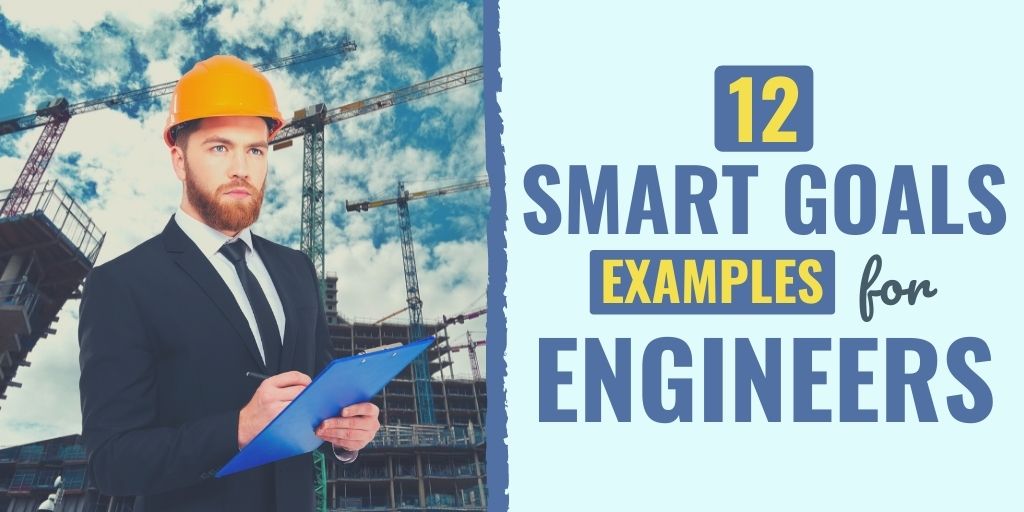Engineering is a broad term that encompasses numerous sub-disciplines. Regardless of your current projects, an engineer requires precision, responsibility, and organizational skills. If you want to improve your job performance, setting SMART goals is an effective tactic, but only if you know how to do it properly.
This article will discuss six examples of SMART goals for engineers to help you advance professionally.
What Are SMART Goals?
SMART goals are practical tools for planning and achieving numerous objectives. They don’t have to be focused only on significant changes and achievements. Instead, SMART goals help you stay focused on your long-term plans by completing smaller tasks that improve your job performance and satisfaction.
These goals are beneficial for several reasons:
SMART goals need to meet specific criteria to work. To better understand what SMART goals are, let’s break down the acronym and explain what every letter stands for:
S: Specific
All of us have specific plans or hopes for the future. Some of these may be realistic, others are not, but typically, they are all vague. Many of us dream about something, but we usually don’t do a lot to achieve those plans, and they remain in our imagination. Unlike these vague fantasies, SMART goals need to be specific. Establish the “who, what, when, where, and why” and create detailed objectives to keep you on your path and enhance your focus. If you’ve had a vision for your future, use it to develop specific actions you need to complete to make the vision come true.
M: Measurable
If you don’t think of a way to measure your success and progress, your goals may seem impossible to achieve, and you may lose focus. Find the metrics that will guide you toward your objectives and make it easy to track your improvement along the way.
A: Achievable
SMART goals are achievable. If you set a goal that’s unrealistic from the very start, you’re likely to give up and even feel frustrated. That could have the opposite effect of what you want to achieve: You may end up feeling burnt out or underappreciated. Setting SMART goals requires balancing between achievable and too challenging. The goal should push you to be better and develop valuable skills, but they shouldn’t be too difficult to accomplish.
Think of the long-term goal you want to achieve. Then, establish what “smaller” actions you need to take along the way to work toward it. The completion of numerous short-term goals will maintain your determination and ambition.
R: Relevant
Every person has numerous goals in life. Regardless of the nature of those goals, they need to revolve around the “bigger picture.” In other words, every goal you set needs to be relevant and have a purpose for your future. Working on something that won’t do you any good in the long run, will seem pointless after a while. Relevant goals will keep you on the right track and improve your willpower.
T: Time-Bound
Setting specific time limits for your goals enables you to create a sense of urgency and responsibility. Without setting a time limit, you may lose yourself along the way, which could influence your ambition and interest. Achieving daily, weekly, and monthly tasks will leave you feeling successful and get you one step closer to your final goals. Plus, time-bound goals reduce the chances of procrastination and losing motivation.
If you want to learn more about these goals and how to use them, read our Ultimate Guide to SMART goals.
Why SMART Goals Are Important for Engineers
SMART goals are beneficial for everyone, regardless of their line of work. If we’re talking about SMART goals for engineers, they can be used on an individual, team, or company level, depending on what you want to achieve.
You can use SMART goals to grow your business, improve teamwork and collaboration with other departments, increase your company’s profits, etc. Moreover, SMART goals can help you personally. For example, if you’ve lost your motivation or ambition, setting specific goals could help you return to your old self and be even better at your job.

One of the most significant challenges engineers face is the advancement of technology. It can be hard to keep up with the current trends and acquire the necessary skills over a short period. Learning how to manage your time effectively, handle your workload, and use tools you haven’t used before can be overwhelming for many engineers. By setting SMART goals, you’ll be able to improve your organization, motivation, and focus, while successfully dealing with the fear of the unknown.
Engineers could also face numerous other challenges and issues: decreased productivity, lack of motivation, not enough income, etc. With SMART goals, you can change those dynamics and work toward better results.
12 SMART Goal Examples for Engineers
1. Improve Team Collaboration
“Over the next two months, I will improve the collaboration between my team members by encouraging the quieter people to speak up at our weekly staff meetings. I will introduce this idea to my team and ask the louder members to allow everyone to participate. This will result in better team dynamics and make everyone feel valuable.“
S: This SMART goal has a specific purpose: improving teamwork and collaboration between team members.
M: The progress can be tracked and measured at every staff meeting. Every meeting that goes well represents an achieved small-term goal.
A: This goal isn’t unrealistic or too challenging. It gives the shyer team members enough time to adjust and speak up without pushing them out of their comfort zone.
R: This SMART goal is essential for the people working in the team. Clear communication and collaboration are critical factors in achieving better results and enjoying the time spent at work. Therefore, achieving this goal is relevant for team members and team leaders.
T: The goal has a specific time limit: two months. This helps keep everyone on track and identify progress and milestones.
2. Improve Skills in Primary Programming Language
“I will aim for promotion by becoming even more skilled in my primary programming language. I will take a six-month course and complete bi-weekly tests to check my knowledge. The course will help me work on better projects and compete for a senior engineer position.“
S: The goal has a specific intention: acquiring new skills to work on new projects and get a promotion.
M: Bi-weekly tests track the progress and make achieving the ultimate goal easier.
A: The SMART goal is reasonable and enables the employee to manage the job and the course without feeling overwhelmed.
R: The goal’s purpose is to improve job performance by acquiring new, relevant skills for the specific line of work.
T: The goal has a time limit: six months.
3. Hold One-on-On Meetings
“I will hold weekly one-on-one meetings to enhance my team members’ motivation for the next five months. I will learn more about their ambitions and career-related goals and use this knowledge when assigning particular projects. This will help me learn more about my team members and establish their strengths.“
S: This SMART goal has a specific purpose. The team leader wants to hold regular meetings with each team member to discuss the job and identify their interests.
M: The goal is measurable because the team leader will hold the meetings every week, making tracking progress easier.
A: This is an achievable goal and doesn’t overwhelm the employees.
R: The goal focuses on getting to know the team members and enhancing their motivation by assigning them the projects they enjoy. It’s relevant for keeping the employees happy and focused.
T: The SMART goal has a set time limit: five months.
4. Improve Recovery Time
“We will automate the crash report trigger to reduce the recovery time after a crash by 40% in the next four months. This will help us get more traffic on our website and grow our business even more.“
S: This SMART goal focuses on decreasing the time it takes to find a solution for a crash.
M: This goal is measurable by analyzing the website traffic.
A: This is an achievable goal with a reasonable timeline.
R: The goal is relevant because it will improve the website traffic and the entire business.
T: The goal will be achieved in the next four months.
5. Read One Technical Book
“I will read one technical book by the end of this year to expand my knowledge. I will read 50 pages every week and take notes. This will help me be better at my job and learn more about the industry.“
S: The goal is specific. It focuses on expanding relevant knowledge.
M: This SMART goal is measurable: 50 pages every week helps you stay on track and maintain focus while getting you closer to completing the book.
A: The goal is achievable. Reading 50 pages per week won’t interfere with your work or private life.
R: Reading a book about a specific area of your work will expand your knowledge and make you better at what you do. Plus, it may lead you to discover other areas you might be good at.
T: The goal is time-bound because it needs to be completed by the end of this year.
6. Fix Problems in the UX
“To eliminate problems in the UX, we’ll repair critical bugs affecting the software by the end of this quarter. Our team of skilled engineers will run test programs after each partial completion to check whether it was successful.“
S: The goal focuses on fixing the problems in the UX.
M: The progress can be measured by test programs run after every partial completion. This enables tracking progress and fixing potential mistakes along the way.
A: The goal is achievable because the team has the necessary skills to complete it. Plus, the goal has a reasonable time limit.
R: This SMART goal is relevant because it improves the UX.
T: This goal has a time limit because it needs to be completed by the end of the quarter.
7. Determine Desired Engineering Field
“My goal is to spend at least one hour per day, or five hours a week, doing research in the field of engineering that I want to be a part of. My overall goal is to determine the field of engineering I want to be in within one month.“
S: This goal is specific – to determine your desired engineering field by the end of four weeks.
M: This goal is measurable because you can easily track how much time you spend doing research, and the goal should be achieved in a set amount of time.
A: This goal is attainable, as all engineers have to decide on a specific career path.
R: This goal is relevant because you must choose a specific type of engineering to further your career.
T: This goal is time-bound – to determine a field of engineering within 4 weeks or as soon as possible.
8. Increase Yearly Salary
“My goal is to apply for at least one new engineering position per week, with the primary goal of increasing my yearly salary from $80,000 to $120,000 within 12 months of starting the job application process.“
S: This goal is specific: to apply to a specific number of positions per week, with the overall goal of increasing your salary by $40,000 within 12 months.
M: This goal is measurable by tracking the number of jobs applied to and comparing the old to your new salary.

A: This goal is realistic and attainable, as many engineering positions offer excellent salaries.
R: This goal is relevant to your overall success in engineering and your quality of life.
T: This goal is time-bound as the aim is to increase your salary within 12 months.
9. Continue Learning in Chosen Field
“My goal is to continue learning in the my field of engineering. My immediate goal is to take at least one class or course per year directly related to my engineering field. I will measure my progress through the course's grading system and ensure that I complete at least one such course per year.“
S: This goal is specific: to engage in continuing education within a particular field, with at least one new course or class taken per year.
M: This goal is measurable because you can track how many courses you take per year. It’s also measurable because you get a grade or score at the end of each course.
A: This goal is attainable, realistic, and even necessary. Continuing education is vital to progress in the engineering field.
R: This goal is relevant, as it directly relates to your overall success in engineering.
T: This goal is time-bound to engage in continued learning every year.
10. Create Good Work-Life Balance
“My goal when working from home is to create a good work-life balance by spending no more than 8 hours per day working, with at least 3 hours per day spent with my family. I will decrease the amount of time spent working per day from 10 hours to 8 hours while increasing family time from 1 hour to 3 hours. I will do so by setting strict work schedules and using various effective time management techniques.“
S: This goal is specific: to create a good work-life balance by increasing time spent with family, decreasing time spent working, and using time management techniques.
M: This goal is easy to measure by setting a schedule, sticking to it, and keeping track of hours worked vs. hours spent with the family.
A: This goal is attainable and realistic, as working from home has become the new norm.
R: This goal is relevant as creating a good work-life balance is vital for your mental health and keeping stress levels at a minimum.
T: This goal is time-bound regarding how much time is spent working vs. how much time is spent with family every day.
11. Communicate with Colleagues
“I will aim to communicate with all relevant colleagues (and clients) via email or video chat at least twice per day. The goal is to increase communication from once to twice per day, specifically at the beginning and end of each day. I will also create a list of daily tasks, both for myself and colleagues, that must be completed by the end of each business day.“
S: This goal is specific - to communicate with colleagues twice a day, to create daily task lists, and to complete all tasks on said list.
M: This goal is measurable by tracking how often you communicate with colleagues. It’s also measurable by keeping track of the number of daily tasks completed.
A: This goal is attainable and realistic, as communication has become easy through various means. Excellent communication is a great habit to have.
R: This goal is relevant, as effective communication and daily priority setting are essential to success in any job.
T: This goal is time-bound – to complete all of these tasks daily.
12. Create New Technology or Method
“My goal is to create a new water collection technology that will allow nearby communities to collect up to 100% more rainwater every week. The goal is to combat water shortages via newly developed rainwater collection technology. The main goal is to help nearby communities overcome water shortage issues within five years from the onset of this project, with a 20% decrease in water shortages per year.”
S: This goal is specific – to create improved rainwater collection methods that will eliminate local water shortages within 5 years.
M: This goal is measurable in how long it takes to reduce water shortages by a certain percentage.
A: This goal is attainable, as advancements on this front are realistic and occurring as we speak.
R: This goal is relevant is it pertains to one of the goals that engineering, in general, aims to tackle – water shortages.
T: This goal is time-bound – to eliminate water shortages in a specific period.
Final Thoughts on Goals for Engineers
Engineers face numerous challenges and difficulties in their line of work. With SMART goals for engineers, you’ll find achieving your short and long-term ambitions and desires much easier. Moreover, these goals can be implemented into every engineering aspect, regardless of your specific position and title. If you want to increase your job performance further, read our guide on building good workplace habits.
And if you want more SMART goal ideas and examples, be sure to check out these blog posts:
- 5 SMART Goals Examples for Dental Hygienists
- 6 SMART Goals Examples for Technicians
- 6 SMART Goals Examples for Your Accounting Career
Finally, if you want to take your goal-setting efforts to the next level, check out this FREE printable worksheet and a step-by-step process that will help you set effective SMART goals.




![5 SMART Goal Setting Worksheets & Templates [2024 Update] Best FREE Goal Setting Worksheets](https://www.developgoodhabits.com/wp-content/uploads/2022/01/smart-goal-setting-300x150.jpg)



